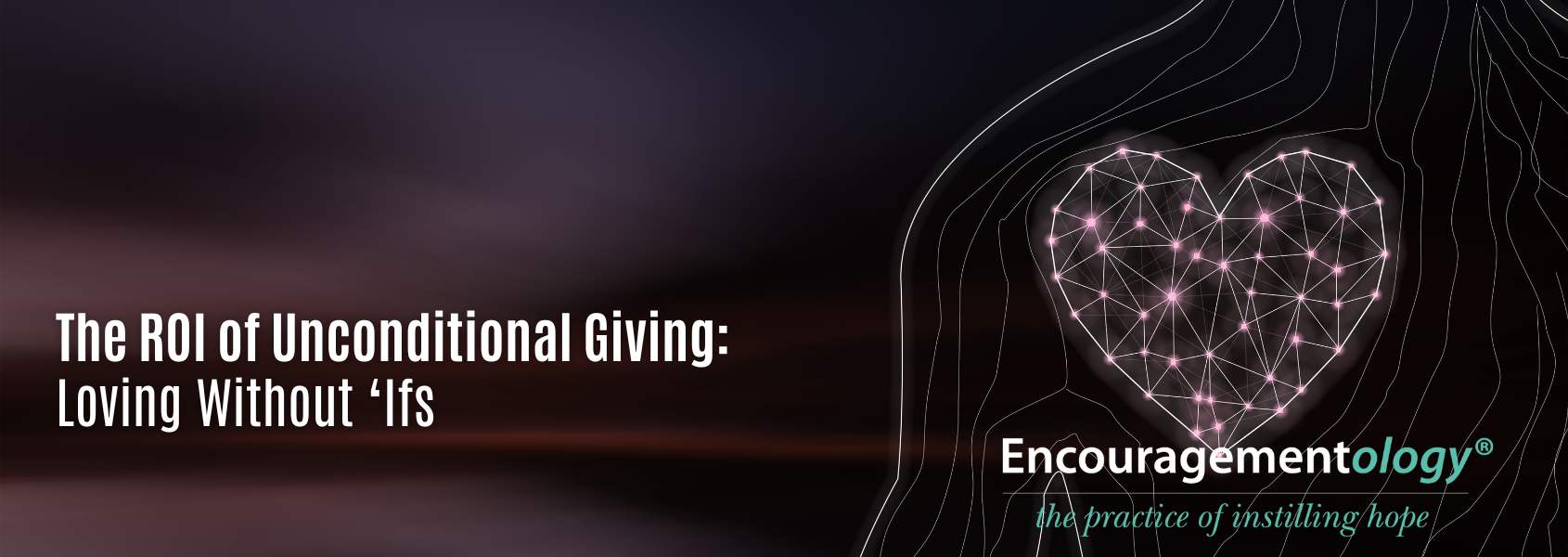SHOW NOTES:
On this show…we are exploring a love without ‘ifs as we calculate the ROI of unconditional giving. Have you ever delivered or been delivered an ultimatum when it comes to love? “I will love you IF….”? How did that make you feel? Well welcome to a conversation that flips the script on giving! Let’s dive into why giving to get will leave your ROI completely upside down. We’ll be exploring the power of unconditional giving—no strings attached, no hidden agendas. It’s all about the deep, soul-level rewards that come when we stop expecting anything in return. After all, love doesn’t come with “ifs” or conditions. So, let’s break down why the best payoffs come when you’re not even looking for one—and why giving with no expectations just might be the ultimate life hack!
As someone who had to learn the hard way that caring and controlling aren’t the same thing, this concept didn’t come naturally to me. When you struggle with people-pleasing, loving with conditions can feel like second nature. Even when you think you’re giving love without expecting anything in return, it doesn’t take long before you realize that, deep down, you’re still craving validation. It’s a sneaky little expectation that can undermine the whole point of unconditional love.
Don’t worry, it may feel a bit like splitting hairs but when the revelation of the difference hits your “over the rim” thinking, a new perspective will open up an exciting new path with soul-nurturing payoffs!
A people pleaser can easily mistake care for controlling behavior because, on the surface, both can seem driven by kindness or concern for others. However, the difference lies in the motivation and expectations behind the actions.
When you’re genuinely caring, you offer support, love, or help without expecting anything in return. You’re tuned in to the needs of others and respect their autonomy. On the other hand, when care becomes controlling, it’s often about managing outcomes—trying to influence someone’s behavior or decisions to get validation, maintain approval, or reduce anxiety.
For a people pleaser, this fine line is crossed when the focus shifts from simply caring for someone to subtly manipulating situations in order to keep peace, avoid conflict, or secure affection. It’s when you’re doing things to make yourself feel better rather than genuinely considering what’s best for the other person.
The key difference is intention: caring allows for freedom, while controlling is about managing outcomes for your own comfort. Recognizing when your help is tied to your own emotional needs or expectations can help you avoid crossing that line.
To test yourself and keep your behavior in check when navigating the line between caring and controlling, try these strategies:
- Ask “Why am I doing this?”
Before you take action, pause and check your motives. Are you offering help because the other person truly needs it, or are you seeking validation or approval? If your reason is more about easing your own discomfort, it may be a sign of control.
- Let go of the outcome
Caring means allowing the other person to choose how they respond, even if the outcome isn’t what you want. If you feel anxious about not getting the “right” response, it’s time to step back and reassess whether you’re trying to control the situation.
- Give people space to fail
Real care respects others’ autonomy and their right to make mistakes. If you feel compelled to step in to “fix” everything, you might be more focused on controlling than supporting. Let them handle it, even if it means learning from failures.
- Practice active listening
When you’re in people-pleasing mode, you might jump to offer solutions without really hearing what the other person needs. Slow down, listen fully, and ask if they actually want your help before offering it.
- Set boundaries—for yourself
Boundaries aren’t just for others; you need them too! Notice when you’re over-extending yourself to meet someone else’s needs, and check if you’re doing so out of a genuine desire or a need to feel validated.
- Check for resentment
If you find yourself feeling resentful or disappointed when your efforts aren’t acknowledged or appreciated, it’s a red flag. True care is given freely, without strings. If resentment creeps in, it’s a sign you may be attaching conditions to your giving.
- Reflect on past patterns
Take time to reflect on situations where you’ve felt drained or frustrated in your efforts to help. Did you expect something in return, even if it was just gratitude or validation? Recognizing these patterns can help you stay aware in the future.
By regularly using these self-checks, you’ll be able to identify when you’re slipping into controlling behavior and steer back toward healthy, unconditional care.
Jason Merchey shares Altruism in Action: Helping Others is a Virtue found at Values of the Wise
CHALLENGE: Give love and care without expecting anything in return—start with small acts and watch how they transform not only the people around you, but also your own sense of fulfillment. Let go of control, embrace genuine compassion, and see how unconditional giving becomes the ultimate reward!
I Know YOU Can Do It!

